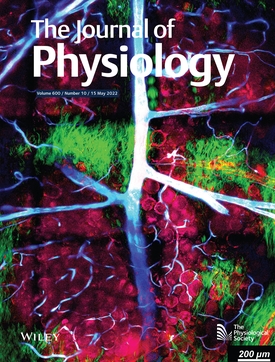注意:前方离子通道交通正在合并
IF 4.7
2区 医学
Q1 NEUROSCIENCES
引用次数: 1
摘要
本文章由计算机程序翻译,如有差异,请以英文原文为准。
Caution: merging ion channel traffic ahead
KCNH2, also known as the human ether-à-go-go related-gene or hERG, encodes the Kv11.1 channel proteins that conduct the rapidly activating delayed rectifier K+ current (IKr) in the heart. IKr plays a primary role in ventricular repolarization, and a decrease or loss in IKr is associated with an increased risk for the deadly cardiac arrhythmias (Sanguinetti et al., 1995). A major goal in cardiac safety assessment is to identify mechanisms that modify IKr, ventricular repolarization, and arrhythmogenic risk. To understand how IKr can be modified, one can think of IKr as being equal to the number of Kv11.1 channels in the membrane (M), the open probability of the Kv11.1 channels (Po), and the amplitude of the single Kv11.1 channel current (i) (Hille, 2001): IKr = MPoi. Po and i reflect the biophysical properties of Kv11.1 channels in the cell membrane. In contrast, M reflects several different cytoplasmic processes, including Kv11.1 channel trafficking, production and degradation. The kinetics of the cytoplasmic processes that regulateM are orders of magnitude slower than the biophysical properties that regulate Po and i (Fig. 1). As a result, modifying Po and i has an immediate impact on IKr and ventricular repolarization, whereas modifying the cytoplasmic processes that regulate M take minutes, hours or even days to fully impact IKr, ventricular repolarization and arrhythmia susceptibility. In this issue of The Journal of Physiology, Meier and colleagues recognized this and developed a model to calculate how changes in the cytoplasmic processes that regulate the number of Kv11.1 channels in the membrane (M), IKr and ventricular repolarization (Meier et al., 2023). To do this, they integrate their model with the O’Hara–Rudy (ORd) ventricular action potential (AP) model (O’Hara et al., 2011). They apply the integrated model to predict how conditions that alter the biophysical properties and number of Kv11.1 channels in the membrane impact IKr and the ventricular AP waveform. This Perspective article provides a primer for how Meier and colleagues modelled the cytoplasmic processes that regulate channel number, and it highlights their important contribution in understanding time-dependent changes in arrhythmogenic risk. Meier and colleagues introduce a two-state kinetic model for the trafficking of an ion channel to the membrane, where the variable M represents the number of channels in the membrane and S the number in the cytoplasm. The number of channels in the membrane increases with membrane insertion and decreases with
求助全文
通过发布文献求助,成功后即可免费获取论文全文。
去求助
来源期刊

Journal of Physiology-London
医学-神经科学
CiteScore
9.70
自引率
7.30%
发文量
817
审稿时长
2 months
期刊介绍:
The Journal of Physiology publishes full-length original Research Papers and Techniques for Physiology, which are short papers aimed at disseminating new techniques for physiological research. Articles solicited by the Editorial Board include Perspectives, Symposium Reports and Topical Reviews, which highlight areas of special physiological interest. CrossTalk articles are short editorial-style invited articles framing a debate between experts in the field on controversial topics. Letters to the Editor and Journal Club articles are also published. All categories of papers are subjected to peer reivew.
The Journal of Physiology welcomes submitted research papers in all areas of physiology. Authors should present original work that illustrates new physiological principles or mechanisms. Papers on work at the molecular level, at the level of the cell membrane, single cells, tissues or organs and on systems physiology are all acceptable. Theoretical papers and papers that use computational models to further our understanding of physiological processes will be considered if based on experimentally derived data and if the hypothesis advanced is directly amenable to experimental testing. While emphasis is on human and mammalian physiology, work on lower vertebrate or invertebrate preparations may be suitable if it furthers the understanding of the functioning of other organisms including mammals.
 求助内容:
求助内容: 应助结果提醒方式:
应助结果提醒方式:


